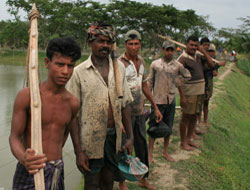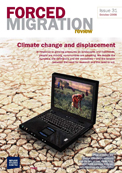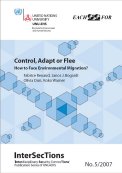
Photo credit: DFID
(DFID) July 13, 2009 – The UK is today launching a major action plan to protect 15 million of the world’s poorest people from the devastating impact of climate change in some of most high-risk flood areas on the planet.
A fifth of Bangladesh – an area almost twice the size of London – could disappear if seas levels rise by one metre. This would destroy crops and livestock, spread disease and leave 30 million people homeless.
Experts predict that devastating natural disasters seen in the last three years such Cyclone Sidr and Tropical Storm Aila – which saw millions lose their homes and thousands killed – will become more frequent in the future.
The UK’s country plan will protect people’s lives and livelihoods against more frequent natural disasters and provide practical support to help them adapt for the impact of climate change. The £75m plan will include:
– Raised housing. Homes in high-risk areas will be raised off the ground to protect millions of families from flash floods, ensuring their property is not simply washed away.
– ‘Flood-friendly’ crops. New crops that are resilient to floods and changes in climate will be introduced to help farmers produce enough food to feed themselves and their families in the toughest circumstances.
– National early warning system. State of the art cyclone forecasting will be set up to ensure people have time to prepare before disasters strike, with alerts sent to villages and towns across the country.
– Infrastructure investment. Renovation of embankments and roads damaged by floods to ensure key transport routes are kept open to allow life-saving supplies to reach even the most remote areas.
– Storm shelters. Thousands of multi-purpose ‘survival’ shelters will be built and equipped to offer men, women and children somewhere to go when cyclones hit.
– Disaster management programme. International experts will be sent to work with the Bangladeshi Government to train and mentor a national disaster team and establish a country-wide emergency plan.
The UK has already committed £50 million to support the ‘Chars Livelihood Programme’, which will help one million people who live on river islands in the Jamuna River raise their homes above the flood level. Our work has already helped more than 300,000 raise their homes and has provided livestock, seeds and other items to almost 50,000 families in this low-lying, flood-prone area.
Mike Foster, International Development Minister said:
“People in villages across Bangladesh are living on the frontline of climate change, with floods and cyclones increasingly a threat to every day life.
“That is why we must take action to deal with what is a very real and immediate danger to the survival of millions men, women and children.
“Many of these people are living in extreme poverty and cannot afford even the most basic of protection. In just a minute, their homes, crops and belongings could simply be washed away, driving them further into poverty.
“Our plan will help break this devastating cycle and prepare people to survive future disasters. We want to give people the tools and skills they need to grow their way out of poverty and build a sustainable future.”
The action on climate change is part of a new Bangladeshi plan that sets out the Department for International Development strategy to build a more stable and prosperous country and bring more than 6 million people out of extreme poverty.
Other key areas in the plan include:
– Increase employment opportunities and incomes for the poorest by giving 70,000 men and women through vocational and English language training;
– Improve conditions for garment and textile employees by working with six major multinational companies to improve conditions and ensure their suppliers have to set decent working and environmental practices;
– Give 4 million children access to five years of primary education. We will also provide £2 million for education programmes to address a funding shortfall that would have resulted in 100,000 pre-primary and primary age children not going to school this year;
– Make sure 4 million pregnant women are looked after by trained midwives. Improve neonatal and maternal health. Our Urban Primary Health Care Programme has already given 400,000 urban poor women access to antenatal care and more than 72,000 deliveries to be conducted safely, with skilled birth attendants;
– Help the Government register 5 million more taxpayers to build robust Government revenues to pay for basic services like health and education.
Source: DFID



